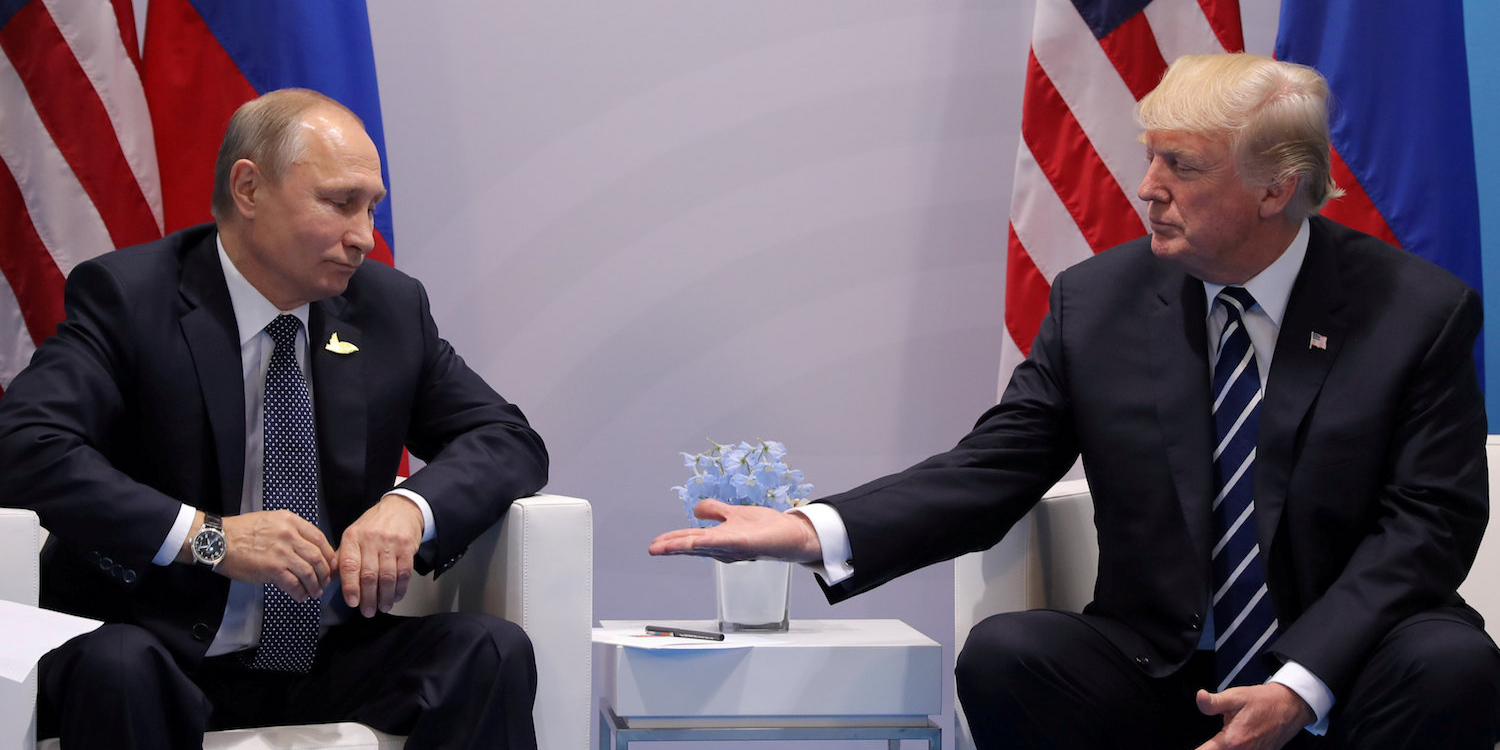- The US and Russia are currently in talks to arrange a summit between US President Donald Trump and Russian President Vladimir Putin.
- Experts say the US has nothing to gain and everything to lose from a meeting between Trump and Putin given current US-Russia relations and Trump’s personal affinity for Putin.
- “But that seems to be the pattern of Trump’s dealmaking,” said one former State Department official. “We move the US embassy to Jerusalem and get nothing in exchange. We give the North Koreans a summit and get nothing in exchange. We pull out of the Iran nuclear deal and get nothing in exchange. This is par for the course.”
The White House and the Kremlin are in the early stages of arranging a summit between US President Donald Trump and Russian President Vladimir Putin, The Wall Street Journal reported late Friday.
Citing people familiar with the matter, the report said the meeting’s purpose would be to resolve longstanding differences between the US and Russia.
The White House confirmed earlier this year that Trump invited Putin to Washington during a phone call the two men had in late March.
News of a Trump-Putin meeting comes as the special counsel Robert Mueller’s investigation into Russia’s interference in the 2016 US election continues to gain steam. In addition to probing Russia’s election meddling, Mueller is also examining whether members of the Trump campaign colluded with Moscow to tilt the election in his favor and whether Trump sought to obstruct justice when he found out about the investigation’s existence last year.
Tensions between the US and Russia aren't limited to the domestic front. On a global scale, Russia is ramping up its aggression toward neighboring Ukraine, and it also continues to be a constant source of support for Syrian President Bashar al-Assad amid the Syrian Civil War.
Meanwhile, Moscow is cultivating closer ties to Beijing in a move that experts say does not bode well for the US. And earlier this week, Russian foreign minister Sergey Lavrov visited North Korea and invited North Korean leader Kim Jong Un to Russia. Lavrov's visit came as the US and North Korea plan for a summit between the countries' leaders on June 12.
"What was Lavrov even doing in Pyongyang? What other interest could they have there other than to undermine us?" said Richard Kauzlarich, a former deputy assistant secretary of state who is an expert on Russia policy. "Things are so far apart between the US and Russia right now that this meeting between Trump and Putin shouldn't even be happening in the first place. The US has nothing to gain here and everything to lose."
Asked about the optics of a Trump-Putin summit amid Mueller's escalating probe and Russia's aggressive posturing on the global stage, one administration official told The Journal, "Of course there are discussions of the political perception."
'Par for the course'

Complicating things further is the apparent juxtaposition between the Trump administration's tougher policy moves against Russia and Trump's personal affinity for the Russian leader.
Mark Simakovsky, a former NATO chief of staff who advised the Department of Defense, emphasized the need for Trump to stay on the same page as his foreign-policy and national-security team to project a stronger stance to Russia.
The way things currently stand, "there's no staying power to the US's moves," Simakovsky said, "so some of our allies and adversaries can say the US is not the global leader on these issues because we don't have a unified policy."
To be sure, the White House has seen no shortage of public policy blunders when it comes to Russia.
In April, for instance, Trump erupted after Nikki Haley, the US's ambassador to the United Nations, announced on television that the US would be imposing new sanctions against Russia for its role in a suspected chemical attack in Syria. Hours after Haley's comments, the White House abruptly reversed its position, blindsiding the UN ambassador.
Earlier, when Haley went on television recently and criticized Russia over its aggression toward Ukraine, Trump reportedly yelled angrily, "Who wrote that for her?"
And last year, when Trump reluctantly approved the sale of US weapons to Ukraine, he warned aides and advisers not to publicly discuss the move.
But in order for a Trump-Putin summit to play out in the US's favor, experts said Trump cannot afford to hold back when he meets face-to-fae with the Russian leader.
"If anything good is to come of a formal meeting between these two, Trump will have to reinforce the notion - eroded under his presidency - that the United States will not turn a blind eye to Moscow's malign influence around the globe," said Edward Price, who served as Senior Director of the National Security Council under President Barack Obama.
He added that Trump will need to send a "forceful signal" that Moscow must change course as it relates to Ukraine, Syria, and its interference in the US election. "Anything less would be taken by Putin to be a green light."
Kauzlarich, however, stressed that the fact that the White House is even planning for such a meeting works to Putin's advantage.
"Putin already won," Kauzlarich said. "He's been seething over how he hasn't been able to establish a relationship with Trump. That this meeting is even being considered gives Putin everything and the US nothing."
"But that seems to be the pattern of Trump's dealmaking," he added. "We move the US embassy to Jerusalem and get nothing in exchange. We give the North Koreans a summit and get nothing in exchange. We pull out of the Iran nuclear deal and get nothing in exchange. This is par for the course."

